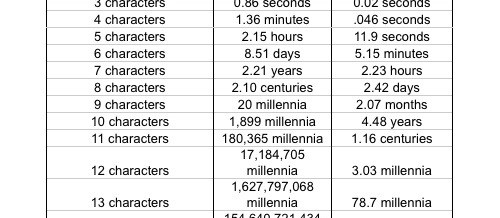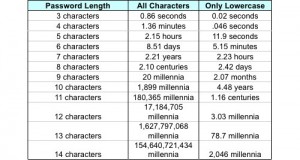
When I teach my computer security class, I show an example of how much difference using a longer or more complex password can make in terms of total number of attempts required to break a password using automated brute force methods that simply try all possible combinations against a password. You can see the table here.
I came across a post by Internet standards expert, CEO of web company iFusion Labs, and blogger John Pozadzides. He knows a thing or two about password security—and he knows exactly how he’d hack the weak passwords you use all over the internet. In his article he looked at the amount of TIME it would take to crack a password using freely downloadable hacker tools and a typical PC to run the exploit. His table is included below.
The difference between using just lower case letters versus all characters – lower and upper case letter, numerals, and the symbols _ – ! @ # $ % & * – in your password is huge. For a typical 6 character password, the crack time goes from 5 minutes to 8 days, at 8 characters from 2 days to 2 centuries.
With all the malicious activity on the Web these days, having a password that is long and strong is really essential. A good password is:
-
6-9 characters, longer is better, using upper and lower case letters, numbers, and symbols
-
Uses character substitution (@ for a, 1 for l, 3 for e, 8 for ate, 4 for for, i.e. p@$$W0rd for password)
-
Uses alternative misspellings for common words (betz for bets)
-
Avoids dictionary words, family names, birthdates or anniversaries
-
Avoids capitalizing the first letter (Secretpassword)
-
Avoids placing the number at the end (Mypassword1)
-
Avoids obvious passwords (same as the user ID, password, opensesame, letmein, or p@$$W0rd)
Do not use:
- A word that can be found in any dictionary. Automated dictionary cracking software would break this in minutes.
-
nicknames
-
birthdays and anniversaries
-
pet names
-
family members’ names
-
memorable dates such as the Battle of Hastings and England’s World Cup victory
-
using "password" as your password
If you have been using the same passwords for many years, make 2010 the year you replace all of them with new passwords.
ShareAPR





About the Author:
I am a cybersecurity and IT instructor, cybersecurity analyst, pen-tester, trainer, and speaker. I am an owner of the WyzCo Group Inc. In addition to consulting on security products and services, I also conduct security audits, compliance audits, vulnerability assessments and penetration tests. I also teach Cybersecurity Awareness Training classes. I work as an information technology and cybersecurity instructor for several training and certification organizations. I have worked in corporate, military, government, and workforce development training environments I am a frequent speaker at professional conferences such as the Minnesota Bloggers Conference, Secure360 Security Conference in 2016, 2017, 2018, 2019, the (ISC)2 World Congress 2016, and the ISSA International Conference 2017, and many local community organizations, including Chambers of Commerce, SCORE, and several school districts. I have been blogging on cybersecurity since 2006 at http://wyzguyscybersecurity.com